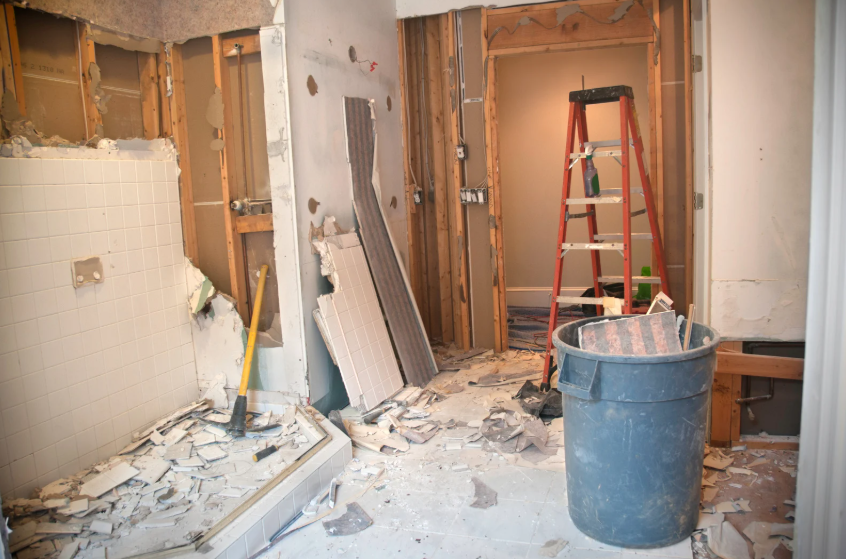Demolition Cleanup Augusta What to Expect in Cleanup Costs
When you’re tackling a major project like demolition cleanup Augusta, the first thing that grabs your attention is the logistics and cost implications. Whether you're clearing out a small shed or an entire commercial structure, understanding what goes into those numbers can make all the difference. If you’ve ever wondered why cleaning up after wrecking walls, tearing down roofing, or dismantling outdated structures feels so demanding—and expensive—you’re not alone. In this comprehensive guide, we’ll weave insights into every facet of demolition cleanup Augusta, including hidden expenses, timelines, and ways to optimize costs. We'll navigate through permit needs, debris sorting, recycling options, and local regulations, all rooted in real-world practices. Stay tuned and prepare to demystify the cleanup process with clarity and confidence.
Understanding the Scope of Demolition Cleanup Augusta
Understanding the full scope of demolition cleanup Augusta means looking far beyond the simple image of a crew hauling off debris. This process involves a strategic sequence of evaluations, safety protocols, equipment use, and disposal planning. Every material on-site—whether it’s structural wood, concrete slabs, or hazardous insulation—must be identified, handled properly, and transported in accordance with local laws. These factors all directly influence your project's timeline and total cost. Recognizing the full picture early allows you to plan smarter and avoid delays or budget surprises down the line.
- Material Identification and Sorting: Each type of debris—wood, metal, drywall, or hazardous substances—must be sorted for proper disposal or recycling, with associated fees and handling rules.
- Hazardous Material Management: The presence of asbestos, mold, or lead paint requires certified personnel, specialized containment, and increased safety measures, which can significantly raise costs.
- Labor and Safety Requirements:
The type of demolition impacts how much labor is needed, with added precautions for structural instability or confined space work zones.
- Site Accessibility and Equipment Needs: Limited space for machinery, steep terrain, or obstructed access points may call for manual labor and more time, affecting cost efficiency.
- Compliance with Local Regulations: Permits, inspections, and adherence to Augusta’s environmental and construction codes are all part of the cleanup equation and carry their own fees.
By understanding these critical factors, property owners and contractors alike can better forecast the true cost and requirements of demolition cleanup Augusta—leading to more predictable, smoother project outcomes.
Labor and Equipment Considerations in Cleanup Costs
Once the scope is defined, labor and equipment enter the picture. Skilled operators and laborers are essential, especially when handling heavy or hazardous debris. Their wages and hours spent on-site form a significant chunk of the total demolition cleanup Augusta cost. Some firms operate by charging hourly rates; others offer flat fees per cubic yard of debris cleared. Either way, labor rate variability across the region can impact your bottom line.
Demolition requires various tools—from sledgehammers and chainsaws to backhoes and skid-steers. Equipment rentals, fuel, maintenance, and operator training all factor into the bill. These costs are often rolled into the cleanup package but knowing how much time and machinery your project calls for can guide your expectations. Small-scale work might rely on manual labor, while larger projects justify heavy machinery. Evaluating labor versus equipment costs is key to balancing efficiency with affordability in demolition cleanup Augusta.
Material Disposal Fees and Recycling Opportunities
Disposal fees are another vital component of demolition cleanup Augusta. Local landfills and transfer stations charge different rates depending on the waste type—mixed loads, concrete, wood, household waste, or hazardous materials each come with distinct pricing. Some disposal facilities offer discounts for clean loads without mixed debris, encouraging contractors to segregate materials on-site.
Recycling initiatives also play a role. Concrete and asphalt can often be crushed and reused, while metals have resale value. Wood can be chipped or repurposed, and cardboard or paper can enter recycling streams. By sorting materials prior to haul-away, clients can reduce landfill charges and recover revenue from recyclables. However, sorting takes time and manpower, which can offset savings. The interplay between disposal fees and recycling options is central when planning your demolition cleanup Augusta budget.

Permits, Regulations, and Environmental Compliance
Any demolition cleanup Augusta venture must abide by local ordinances and environmental guidelines. Augusta has specific codes regarding dust suppression, noise ordinances, stormwater management, and debris containment. Moreover, if the site touches wetlands or protected areas, additional regulations may come into play.
Obtaining demolition and debris removal permits costs money—and time. Inspections might be required before and after demolition. Working with waste containing asbestos or lead necessitates licensed abatement contractors, air monitoring, and specialized disposal processes. Non-compliance can result in hefty fines or forced project delays. To avoid surprises, be sure to include permit costs, regulatory compliance, and inspection fees in your budget. Though these costs may feel extraneous, they’re critical to conducting demolition legally and responsibly in Augusta.
Transportation and Hauling Logistics
When demolition debris piles up, it must go somewhere—and if cleanup needs are extensive, hauling becomes a major cost driver. Dump truck rentals might be charged daily or per load, with additional fees for travel distance and time. For demolition cleanup Augusta, trucks often shuttle between sites and local landfills or recycling centers, multiple times a day.
Project managers also need to consider site access: are there tight entryways or urban traffic concerns? Delays during peak hours increase truck idling and crew downtime. Moreover, weight restrictions on roads may force off-hour or alternate-route hauling, leading to overtime rates. Fuel consumption, tolls, and distance to disposal sites all feed into the transport charge. By understanding haul logistics early, you can seek more accurate quotes and lower unforeseen expenses.
Hazardous Materials and Specialized Waste Removal
Not all demolition debris is created equal. Materials like asbestos siding, lead-based paint, old wiring, and chemical storage tanks fall under hazardous waste categories. Handling these items requires specially trained crews, containment procedures, signage, and disposal at certified facilities.
Hazardous waste cleanup can easily double or triple the cost compared to standard demolition cleanup Augusta due to the specialized equipment, labor certifications, and regulatory paperwork involved. Testing for contaminants, filling out manifests, and awaiting clearance from regulatory bodies all add to the timeline and price. As such, early detection and thorough site inspection are essential. Knowing the hazards ahead of time not only ensures safety but also helps clients budget realistically for the cleanup effort.
Timeline Impacts on Cleanup Expenses
Time is money, especially in demolition cleanup Augusta. Rapid project timelines can raise costs significantly. Rush projects may require double shifts, weekend work, or premium equipment rentals. Crews working outside of regular hours are often billed at overtime rates, sometimes 1.5 to 2 times standard pay.
Conversely, staggered schedules can stretch labor days and equipment rentals, causing better day rates but longer overall project timelines. Budget-wise, it’s crucial to find a balance. Clarify whether your demolition cleanup needs a fast turnaround or if a phased approach is acceptable. Discuss options with your contracted provider; they may offer bundled rates for firm schedule commitments. Timely, realistic planning saves money in both labor flexibility fees and equipment usage.
Hidden Charges You Might Overlook
Demolition cleanup Augusta quotes can sometimes hide unexpected fees. Examples include mobilization charges for transporting crews and equipment to the jobsite, debris sorting on-site, batch tests for hazardous content, or temporary fencing for safety and compliance. If the demo area includes tall structures or trees, crane rentals or certified arborists may be required.
There may also be charges for water trucks to suppress dust, dumpsters left on-site, and site cleanup at day’s end. While these services improve site safety and efficiency, they often aren't spelled out in initial quotes. To avoid surprises, request a detailed breakdown of all potential fees—labor categories, equipment rates, rental duration, disposal types, regulatory permits, and logistical costs. Armed with this clarity, you'll anticipate total costs more accurately for demolition cleanup Augusta.
How to Optimize Your Cleanup Budget
While demolition cleanup Augusta can get pricey, there are smart ways to optimize your budget. First, clear as much onsite waste as possible before the demo—fewer materials mean less labor and disposal fees. Second, reuse or recycle materials: salvaged lumber, reusable fixtures, or recyclable metal can offset costs and reduce landfill fees.
Contract strategically. Some companies offer tiered pricing based on debris volume or type; a clean, sorted site can earn a lower rate. Cooperative scheduling—like combining multiple jobs in one area—can lower mobilization costs. Bundle services if you need tree trimming, concrete cutting, or dumpster rental; integrated quotes often cost less than standalone hires. Above all, compare local demolition cleanup Augusta providers to find balance between price, reputation, and responsiveness.
Choosing the Right Demolition Cleanup Service
Selecting the right company for your demolition cleanup Augusta project sets the tone for success. Look for providers who conduct free site visits and offer transparent quotes with clearly defined line-item costs. Ensure they have proper licensing, insurance, and safety protocols. Ask about recycling practices—companies committed to sustainability often pass savings on to clients.
Reviews and referrals matter, but so does communication. Professional contractors should clarify permit responsibilities, timelines, and contingency plans. A good contractor prepares you for possibilities—like hazardous material discovery—while still offering flexibility if plans shift. Ultimately, a reliable partner balances expense with excellence, delivering efficient demolition cleanup Augusta without compromising on safety or compliance.
Conclusion
Bringing your demolition cleanup effort to completion can feel overwhelming, but understanding the full scope of demolition cleanup Augusta makes the process more manageable. From labor and equipment to disposal fees, permits, hazardous material handling, and surprise surcharges, every detail affects your overall cost. Staying informed by securing detailed quotes, evaluating recycling options, and working with a trusted provider helps you control expenses without compromising on safety or quality.
For homeowners and businesses in Augusta, partnering with a local expert ensures smoother coordination, timely service, and adherence to all regulations. When it’s time to clean up after demolition, trust the reliable professionals at Hinkins Disposal llc, located at 246 Robert C Daniel Jr Pkwy #1441, Augusta, GA 30909. Call +1 706-885-4032 or email Hinkinsdisposal@gmail.com.




